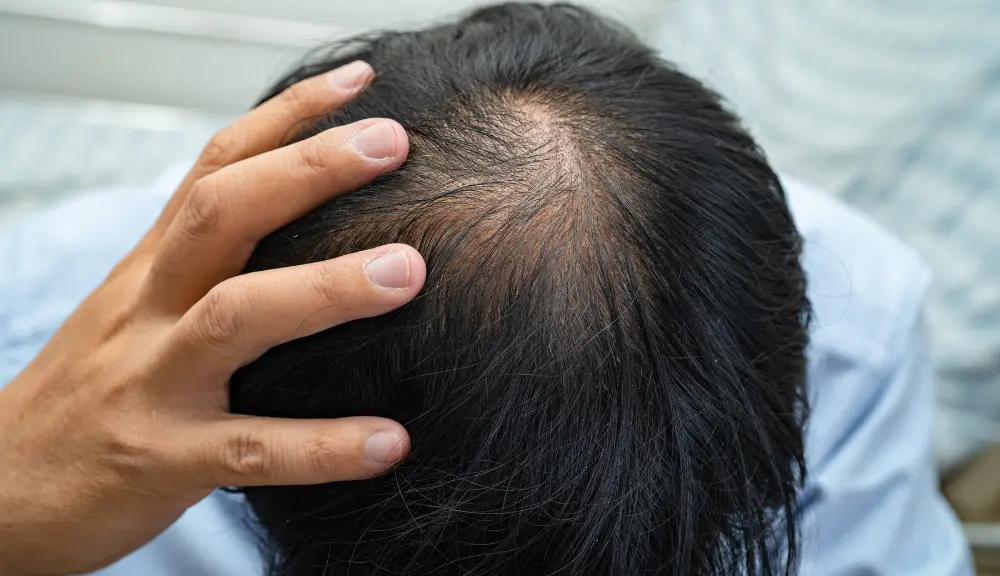Ozempic, the once-weekly injectable medication making waves in the diabetes and weight loss community, has sparked a new buzz and not the good kind. Women are reporting unexpected hair thinning and even noticeable hair loss while on the medication.
But is Ozempic really to blame for this shedding drama? Let’s break it down.
What Is Ozempic & Why Are Women Using It?
Ozempic (semaglutide) is an FDA-approved drug used to manage type 2 diabetes. It works by regulating blood sugar levels and slowing down digestion, helping people feel fuller for longer. However, its unexpected side effect of weight loss has made it wildly popular off-label for shedding pounds.
In fact, Ozempic’s weight-loss potential has turned it into a go-to option for celebrities and influencers looking to slim down, the whole Hollywood skinny jab situation.
Why Does Hair Loss Occur?
If you’re noticing more strands in your hairbrush or watching your shower drain transform into a hairy crime scene, you might be wondering if Ozempic is the villain. Here’s the scoop: hair loss isn’t listed as a direct side effect of Ozempic. However, it can be an indirect consequence of what the medication does to your body.
The most likely culprit? Rapid weight loss.
Losing weight too quickly (thanks to Ozempic’s appetite-curbing powers) can shock your system. This stress sends hair follicles into a temporary resting phase, a condition known as telogen effluvium.
The result? Shedding galore.
Other possible contributors include:
- Nutritional Deficiency: Shedding pounds fast can mean missing out on essential nutrients, like iron, biotin, and zinc, all of which your hair loves.
- Stress on the Body: Weight loss, even intentional, is still perceived by your body as a form of physical stress, which can kick start temporary hair thinning.
Who’s At Risk?
While anyone taking Ozempic can potentially experience hair fall and thinning, women seem to be reporting it more frequently.
Why?
- Hormonal Fluctuations: Women’s bodies are already prone to hair loss triggers, such as postpartum hair fall or menopause-related thinning or hair fall due hormonal imbalance.
- Frequent Styling & Treatments: Regular heat styling, coloring, and tight hairstyles make women’s hair more vulnerable to damage, compounding the issue.
How Long Does Ozempic Hair Loss Last?
Here’s the good news: it’s usually temporary. Telogen effluvium typically lasts 3 to 6 months, after which your hair should gradually return to its former glory. However, if you continue to lose weight rapidly or have ongoing nutritional deficiencies, it might take longer for your hair to bounce back.
How To Prevent & Treat Hair Loss While On Ozempic?
If you’re committed to using Ozempic but want to keep your hair game strong, here’s what you can do:
- Prioritize Nutrition: Make sure you’re getting enough protein, iron, zinc, and biotin. A multivitamin or hair supplement can help fill in the nutritional gaps.
- Be Gentle with Your Hair: Skip the tight ponytails and aggressive brushing. Use a wide-tooth comb and switch to a gentle, sulfate-free shampoo.
- Consider Hair Growth Boosters: Minoxidil pills, its tropical cream or peptide-based hair serums can help stimulate regrowth.
- Stay Hydrated: Your hair loves water almost as much as you love coffee. Dehydration can worsen hair shedding, so keep sipping.
When To See A Doctor?
If your hair is falling out faster than plot twists in a soap opera even after a month or two, it’s worth consulting a dermatologist or trichologist. They can help rule out other potential causes, like hormonal imbalances, thyroid issues, or underlying scalp conditions.
Over To You
While hair loss linked to Ozempic can be alarming, it’s typically short-lived. The key is to focus on slow, steady weight loss (easier said than done, we know) and give your hair the nourishment it needs. So, if you’re seeing more strands on your pillow, don’t panic. Your hair is probably just going through a temporary phase and it will come back stronger.
If you’re experiencing persistent hair loss, consider discussing alternative medications with your healthcare provider. Sometimes, the path to health doesn’t have to involve parting ways with your hairline.








